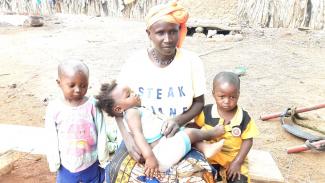Fatoumata Bagayoko, a 33-year-old mother of seven, lives with her husband in a village in the Bougouni health district. Years into her marriage, she was not using any family planning methods, and she experienced three pregnancies in less than three years, adversely affecting both her health and that of her youngest child.
I was very weakened due to recurring health problems, including dizziness and paleness. During the same period, my last child experienced an episode of moderate acute malnutrition.” Fatoumata said.
Moreover, she had to temporarily pull her eldest daughter out of school to help her, as she was unable to care for all her children by herself.
Upon learning of Fatoumata's circumstances, a community development agent, together with members of nutrition support group visited the couple. Their goal was to enlighten them on the significance of choosing a family planning method. These nutrition support groups work at the community level to ensure the prevention and community management of malnutrition among children aged 0 to 5 years and pregnant and lactating women. Guided by the recommendations of the group members and the community development agent, the couple decided to adopt birth spacing. After a counseling session with the village matron, they chose a family planning method that was aligned with their needs. The couple has scheduled follow up visits to support Fatoumata to continue with her family planning method without problems.
USAID Keneya Nieta (household and community health) activity plays a crucial role in strengthening the skills of nutrition support group members to improve maternal, newborn, and child health. moreover, the activity provides coaching and mentoring to 3,859 group members to strengthen household knowledge and advocate for practices such as consuming rich and varied local foods for improved nutrition, using pre- and post-natal care, encouraging deliveries in health centers, adopting family planning methods after delivery, and ensuring child immunization.
Two years into practicing family planning, Fatoumata has noticed positive changes.
Honestly, birth spacing has been beneficial for my well-being as well as that of my children,” she says and continues “I am happy and, I have recovered my health and my ability to carry out all my domestic tasks while taking good care of my children.”
As an experienced client, Fatoumata is dedicated to guiding her peers in her village, aiming to spare them the hardships she faced by sharing her insights and advice on the challenges associated with closely spaced pregnancies.
USAID, through Keneya Nieta, provides key support to promote birth spacing, thus aiming to improve maternal, neonatal and child health. Thanks to the intervention of that activity, in 2023 an average of 4,185 new women have adopted a family planning method each month in the regions of Mopti, Ségou and Sikasso.

Kadidia Diakité, community development agent, USAID Keneya Nieta
